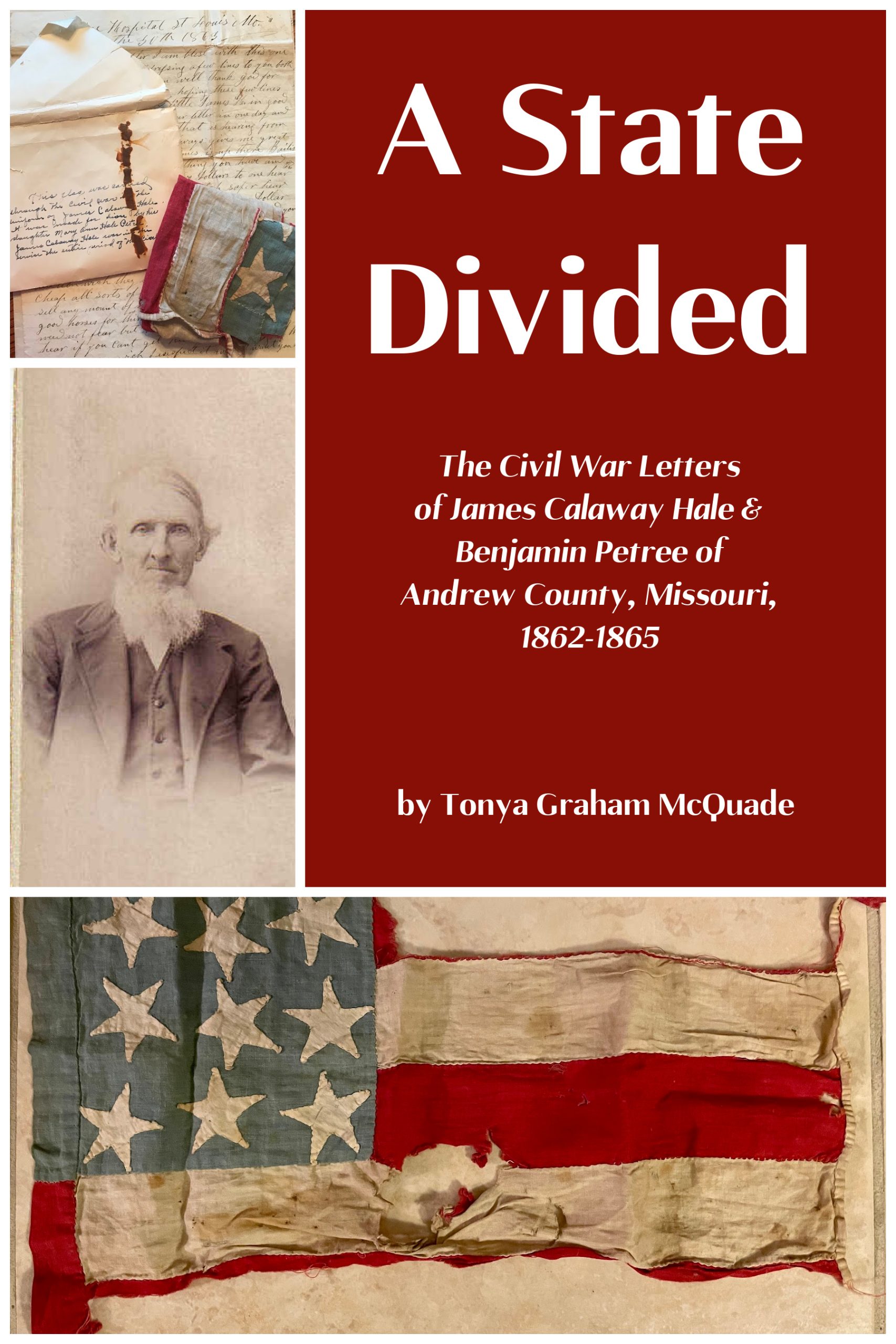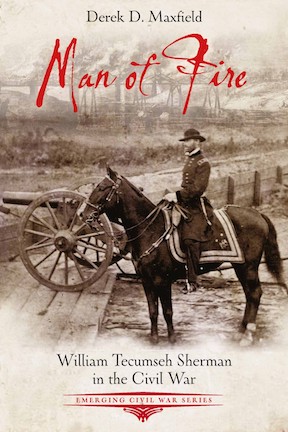Our Favorite Books: “Which is your favorite of your books?”
As we’ve been talking about favorite books here at ECW, I’ve admired how readily everyone heaps praise on the work done by other authors even as they keep quiet about their own great work. Being a generally modest bunch, no one’s wanted to cheerlead for themselves.
So I told them I’d do it for them.
After all, some of my colleagues have written some pretty awesome books.
I love these people, I love their work, and I love talking about writing, so I asked them, “Which is your favorite of your books? Why?”
What follows is a summary of my conversations. Cecily Zander’s last name has essentially doomed her to the end of any alphabetical list—so I’m going to start with her and work backwards.
 Cecily Nelson Zander: “I wrote my book The Army Under Fire, while a postdoc at the Center for Presidential History at Southern Methodist University. As a result, much of what I enjoy about the book, looking back on it now, are the memories of that writing process. As many of us know, friends make the generally solitary activity of writing much more rewarding. For any of our readers who have not been subjected to hearing about the book, it’s the first full-length study of antimilitarism in the Civil War era, and looks at the Old Army in the antebellum era, the struggle between the Regulars and citizen soldiers during the Civil War, and the challenges the army faced in balancing Reconstruction and western expansion after the conflict. It’s also short and has plenty of pictures, so I’m proud of that.” (LSU, 2024—click here)(ECW Podcast episode here)
Cecily Nelson Zander: “I wrote my book The Army Under Fire, while a postdoc at the Center for Presidential History at Southern Methodist University. As a result, much of what I enjoy about the book, looking back on it now, are the memories of that writing process. As many of us know, friends make the generally solitary activity of writing much more rewarding. For any of our readers who have not been subjected to hearing about the book, it’s the first full-length study of antimilitarism in the Civil War era, and looks at the Old Army in the antebellum era, the struggle between the Regulars and citizen soldiers during the Civil War, and the challenges the army faced in balancing Reconstruction and western expansion after the conflict. It’s also short and has plenty of pictures, so I’m proud of that.” (LSU, 2024—click here)(ECW Podcast episode here)
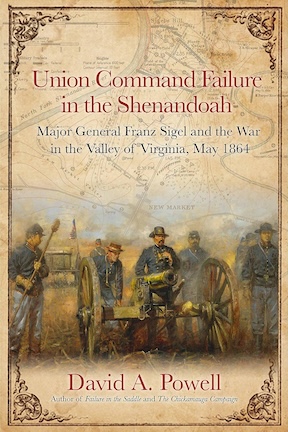 Dave Powell: “While I am proud of all my books, especially the work I have put in on Chickamauga, I do have a sentimental favorite: Union Command Failure in the Shenandoah Valley. I undertook this book because I wanted to write about the battle of New Market, which is understandable given my attendance at the Virginia Military Institute and many weekends spent doing living history at that park. But I also love that book because it goes beyond the usual explanations of Union failure (mainly: Franz Sigel was incompetent) to try and understand the derailment of Federal strategy and command breakdowns that led to the Union defeat on May 15th, 1864. Personally, I think it remains some of the best analysis I have done in all my writings.” (Savas Beatie, 2019—click here)
Dave Powell: “While I am proud of all my books, especially the work I have put in on Chickamauga, I do have a sentimental favorite: Union Command Failure in the Shenandoah Valley. I undertook this book because I wanted to write about the battle of New Market, which is understandable given my attendance at the Virginia Military Institute and many weekends spent doing living history at that park. But I also love that book because it goes beyond the usual explanations of Union failure (mainly: Franz Sigel was incompetent) to try and understand the derailment of Federal strategy and command breakdowns that led to the Union defeat on May 15th, 1864. Personally, I think it remains some of the best analysis I have done in all my writings.” (Savas Beatie, 2019—click here)
 Ryan Quint: “With Dranesville, I’m proud to have written something that no one else had really touched before, which is increasingly rare with the Civil War. It’s a story that’s important because it reminds us that the war wasn’t just on the battlefield; it impacted homes and towns big and small. It pitted neighbors against neighbors and sends us a chilling rearming of political violence 165 years later.” (Savas Beatie, 2024—click here)(ECW Podcast episode here)
Ryan Quint: “With Dranesville, I’m proud to have written something that no one else had really touched before, which is increasingly rare with the Civil War. It’s a story that’s important because it reminds us that the war wasn’t just on the battlefield; it impacted homes and towns big and small. It pitted neighbors against neighbors and sends us a chilling rearming of political violence 165 years later.” (Savas Beatie, 2024—click here)(ECW Podcast episode here)
Tonya McQuade: “A State Divided: The Civil War Letters of James Calaway Hale and Benjamin Petree of Andrew County, Missouri offers a look at what the average Missouri soldier was thinking during the war. The book presents fifty previously unpublished Civil War letters that provide vivid insights into Hale and Petree’s experiences as they march and drill with their regiments, encounter guerrillas and enemy troops, witness the buildup to the Vicksburg Campaign, get an in-depth look at wartime St. Louis, trek with Sherman through the Carolinas, ponder the devastation they encounter, and celebrate victory in Washington, D.C.” (Independently published, 2024—click here)(ECW podcast episode here)
Derek Maxfield: “While I thoroughly enjoyed researching and writing my first book, Hellmira: The Union’s Most Infamous Civil War Prison Camp—Elmira, NY, my favorite book will probably always be my latest: Man of Fire: William Tecumseh Sherman in the Civil War. This project was a labor of love; I love biography and often teach history using this genre. When I had the opportunity to write a biography of Sherman, I was extremely excited and highly motivated. I now understand what writers mean by “flow.” I sat down, wrote eight hours a day, and had the first draft done in about a month. The story just flowed through me. It was invigorating and a bit daunting. Someday I hope to expand on this work with a Sherman post-war biography. For now, Man of Fire remains my favorite work and is likely to remain so.” (Savas Beatie, 2023—click here)(ECW podcast episode here)
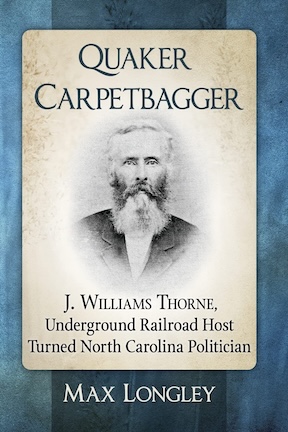 Max Longley: “Quaker Carpetbagger is about J. Williams Thorne (1817–1897), a Quaker farmer, abolitionist, and later ‘carpetbagger.’ I believe I am the only researcher who got to look at his extensive family records, held by a descendant. Thorne was big in the Underground Railroad in southeastern Pennsylvania before the war. He helped rescue a free black laborer (a tenant of his) who was kidnapped into slavery, and he helped get the kidnappers prosecuted for kidnapping. One of the kidnappers burned Thorne’s barn. After the war, Thorne moved to rural Warren County, North Carolina, to engage in farming and Republican politics. He went to the state legislature, where the state House expelled him for an anti-Christian pamphlet he published as part of a debate up North in Pennsylvania (which he continued to visit part of the year).” (McFarland Publishers, 2020—click here)
Max Longley: “Quaker Carpetbagger is about J. Williams Thorne (1817–1897), a Quaker farmer, abolitionist, and later ‘carpetbagger.’ I believe I am the only researcher who got to look at his extensive family records, held by a descendant. Thorne was big in the Underground Railroad in southeastern Pennsylvania before the war. He helped rescue a free black laborer (a tenant of his) who was kidnapped into slavery, and he helped get the kidnappers prosecuted for kidnapping. One of the kidnappers burned Thorne’s barn. After the war, Thorne moved to rural Warren County, North Carolina, to engage in farming and Republican politics. He went to the state legislature, where the state House expelled him for an anti-Christian pamphlet he published as part of a debate up North in Pennsylvania (which he continued to visit part of the year).” (McFarland Publishers, 2020—click here)
 Chris Kolakowski: “The Civil War at Perryville was my first book, and writing it fulfilled a lifelong dream. It is first among equals in my list of books and will always be the one that made me a book author. I’m also really proud of how concisely it captures a complex campaign and breaks new ground in places.” (History Press, 2009—click here)(ECW Podcast episode here)
Chris Kolakowski: “The Civil War at Perryville was my first book, and writing it fulfilled a lifelong dream. It is first among equals in my list of books and will always be the one that made me a book author. I’m also really proud of how concisely it captures a complex campaign and breaks new ground in places.” (History Press, 2009—click here)(ECW Podcast episode here)
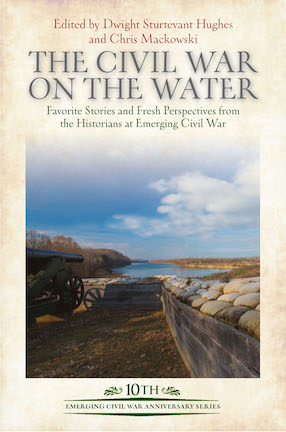 Dwight Hughes: “For The Civil War on the Water, it was particularly gratifying (and fun!) to resurrect from the dusty archives of the Emerging Civil War blog, and then compile and edit, a collection of naval history posts into this ECW 10th Anniversary Series volume. The book included my posts along with entries and original essays by talented colleagues. The blog is a wonderful short-format mechanism for pursuing interests, polishing prose, and building an oeuvre. This anthology provided an opportunity to highlight a decade’s worth of material in browsable format for new and wider audiences.” (Savas Beatie, 2023—click here)(ECW Podcast episode here)
Dwight Hughes: “For The Civil War on the Water, it was particularly gratifying (and fun!) to resurrect from the dusty archives of the Emerging Civil War blog, and then compile and edit, a collection of naval history posts into this ECW 10th Anniversary Series volume. The book included my posts along with entries and original essays by talented colleagues. The blog is a wonderful short-format mechanism for pursuing interests, polishing prose, and building an oeuvre. This anthology provided an opportunity to highlight a decade’s worth of material in browsable format for new and wider audiences.” (Savas Beatie, 2023—click here)(ECW Podcast episode here)
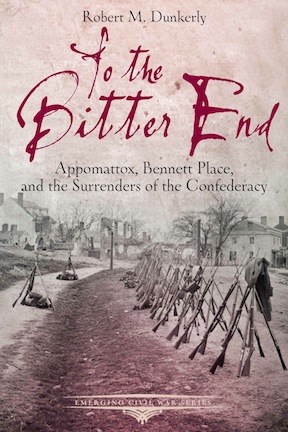 Bert Dunkerly: “The ECW book I’m most proud of is To The Bitter End. No one thinks much about how conflicts end because we usually spend our time studying the battles. I’d always been interested in the surrenders, and having worked at Appomattox, I had a basic knowledge of the lesser-known ones. Chris nudged me to do a book on them all, and that was all it took. I loved digging into these overlooked stories. They are fascinating, with many twists and turns. When I speak about this book to groups, I get the best questions and discussions.” (Savas Beatie, 2015—click here)
Bert Dunkerly: “The ECW book I’m most proud of is To The Bitter End. No one thinks much about how conflicts end because we usually spend our time studying the battles. I’d always been interested in the surrenders, and having worked at Appomattox, I had a basic knowledge of the lesser-known ones. Chris nudged me to do a book on them all, and that was all it took. I loved digging into these overlooked stories. They are fascinating, with many twists and turns. When I speak about this book to groups, I get the best questions and discussions.” (Savas Beatie, 2015—click here)
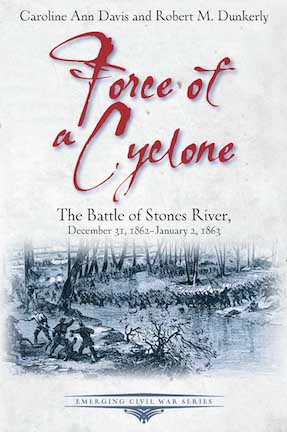 Caroline Davis: “I am mighty proud of the Stones River book, Force of a Cyclone! I love the book because both Bert Dunkerly and I had a passion for the battle and the key players there, and I think that really shines through. The battlefield holds a very special place in our hearts, and to have a book that shows the importance of the relatively unknown and understudied battle is a great contribution to the ECW Series.” (Savas Beatie, 2023—click here)
Caroline Davis: “I am mighty proud of the Stones River book, Force of a Cyclone! I love the book because both Bert Dunkerly and I had a passion for the battle and the key players there, and I think that really shines through. The battlefield holds a very special place in our hearts, and to have a book that shows the importance of the relatively unknown and understudied battle is a great contribution to the ECW Series.” (Savas Beatie, 2023—click here)
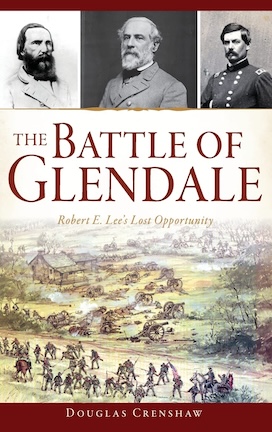 Doug Crenshaw: “My favorite book I’ve written is The Battle of Glendale. The story of the battle is fascinating, and it was probably one of Lee’s greatest missed opportunities—if not the greatest. He had the Federal army strung out in front of him, marching towards Malvern Hill and then on to the James River. Lee’s plan was for his 72,000 men to cut the Federal army in half by seizing the Glendale intersection, which would then let him inflict serious damage on one or both parts. Unfortunately, each of his division commanders, with the exception of Longstreet and A. P. Hill, failed him. It’s an intriguing and almost unbelievable tale of an army’s failure.” (History Press, 2017—click here)
Doug Crenshaw: “My favorite book I’ve written is The Battle of Glendale. The story of the battle is fascinating, and it was probably one of Lee’s greatest missed opportunities—if not the greatest. He had the Federal army strung out in front of him, marching towards Malvern Hill and then on to the James River. Lee’s plan was for his 72,000 men to cut the Federal army in half by seizing the Glendale intersection, which would then let him inflict serious damage on one or both parts. Unfortunately, each of his division commanders, with the exception of Longstreet and A. P. Hill, failed him. It’s an intriguing and almost unbelievable tale of an army’s failure.” (History Press, 2017—click here)
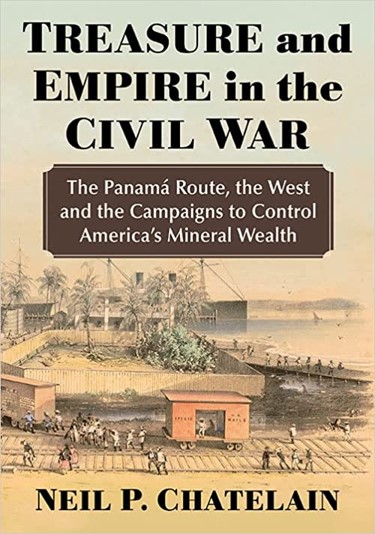 Neil P. Chatelain: “I think Treasure and Empire in the Civil War is special because it merges much of the recent historiography about the far West and international diplomacy in the Civil War, combining both with original scholarship about the US Navy’s defense of the Panama route. Civil War readers have heard of many of the locations, ships, and people in the story, but no one has ever linked everything together into a grand narrative. Lots of Civil War books argue over the details of events largely understood, but Treasure and Empire explores forgotten dimensions of the war, helping people think about the conflict in new lights.” (McFarland, 2024—click here)(ECW Podcast episode here)
Neil P. Chatelain: “I think Treasure and Empire in the Civil War is special because it merges much of the recent historiography about the far West and international diplomacy in the Civil War, combining both with original scholarship about the US Navy’s defense of the Panama route. Civil War readers have heard of many of the locations, ships, and people in the story, but no one has ever linked everything together into a grand narrative. Lots of Civil War books argue over the details of events largely understood, but Treasure and Empire explores forgotten dimensions of the war, helping people think about the conflict in new lights.” (McFarland, 2024—click here)(ECW Podcast episode here)

